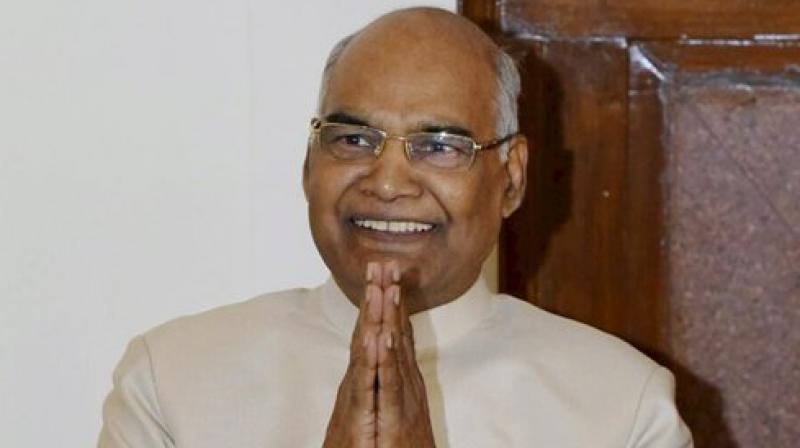BJP's safe man at Rashtrapati Bhavan
In his very first speech on July 25 Ram Nath Kovind made known his fealty to the BJP's creed.

On July 25, Ram Nath Kovind was sworn in as India’s 14th President. The RSS mouthpiece Organiser characterised him as one “deeply rooted in the ideological stream of the RSS”. Like all prime ministers, Narendra Modi wanted a “safe” person in the Rashtrapati Bhavan. India’s presidents have been a varied lot. The first president, Rajendra Prasad sought to grab power for himself less than two months after assuming the presidency. He sent Nehru a note dated March 21, 1950, in which he sought to reopen the very issue on which, in his presence, the Constituent Assembly had decided. The president is a constitutional head of state in a parliamentary democracy in which the prime minister is the chief executive. Granville Austin’s criticism of the president is apt: “Had his first attempt to ignore conventional restrictions and to play the part of his own pM not been foiled, parliamentary government in India would have disappeared.” His successor, Dr S. Radhakrishnan was ambitious. The American ambassador, Chester Bowles, recorded: “On several occasions, he expressed to me in a half-joking manner the wish that somehow after Nehru’s death or retirement, the whole country could operate under ‘president rule’ for a few months.” Indira Gandhi was hardly the person who would suffer an ‘uncle’ as president. She refused him a second term.
Zakir Husain, a model president, died after a heart attack in 1969. The Congress party overruled Indira Gandhi, and selected her critic as candidate for the presidency. She selected her own favourite and got him elected, splitting the Congress. V.V. Giri was the first “rubber-stamp” president. His successor Fakhruddin Ali Ahmed became infamous for signing the Proclamation of Emergency in 1975. Zail Singh began as a rubber stamp under Indira Gandhi but became a dangerous problem when her son Rajiv Gandhi snubbed him. Twice, in 1987, he contemplated dismissing the PM. The Indian presidency came into its own only in 1992 with the election of Dr Shankar Dayal Sharma as president. He was neither a rubber stamp nor an intriguer but a constitutional head alive to his limits and to his duties. He asserted his independence. On December 6, 1992, when the Babri Mosque was demolished, he had a statement issued: “The president, Dr Shankar Dayal Sharma, has strongly deplored vandalism that has caused damage to the masjid in Ayodhya and has observed that such acts are against Hinduism.”
His successor K.R. Narayanan strongly condemned the killings of a missionary and his son by Bajrang Dal. president Pranab Mukherjee did not emulate these examples when lynching of Muslims in the cow protection campaign became endemic. He contented himself with uttering careful comments which would not hurt the BJP but were so couched as to pass for criticism. A fawning media lauded him to the skies. Indian practice has yielded conventions which are well recognised. First, the president is entitled, to question the government’s policy, particularly judicial appointments and imposition of direct central rule in the state. Second, within limits, Presidents can comment on affairs of the state in public. Third, the President is entitled to even censure the Prime Minister in private. Fourth, he has a right to know. Fifth, there is now a practice where the President can receive opposition leaders who may came to lodge a protest against the government.
Sixth, the President is not bound to accept a request by the Prime Minister’s to dissolve the lower House and can exercise his judgment. Seventh, the power of dismissal of the government cannot be exercised except on extreme grounds. Eighth, not only the Opposition parties but the CMs also invoke the President’s moral authority as “guardian of the Constitution”. The question whether the President has a right to address Parliament on his own is open. Hence the need to keep a safe man in the President’s house. In his very first speech on July 25 Ram Nath Kovind made known his fealty to the BJP’s creed.
By arrangement with Dawn

